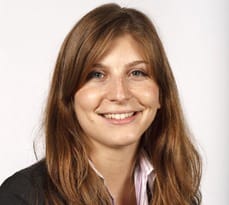

In July this year the Cambridge Gates Foundation held a biennial event to celebrate Gates Scholars past and present. In a video to support the event, Bill Gates mentioned former Cambridge MBA Gates Scholar Noa Epstein-Tennenhaus, and her work in bringing together future Israeli and Palestinian entrepreneurs in her role as chief executive of MEET (Middle East Entrepreneurs of Tomorrow).
Although Noa is no longer CEO of MEET, her commitment to the initiative remains, and the work she did continues to benefit students enrolled in the programme. MEET is an NGO in Jerusalem and Nazareth that connects young Israelis and Palestinians (16-18 year olds) to create positive change through technology and entrepreneurship, in partnership with the Massachusetts Institute of Technology.
Having previously worked in the NGO field, and with a degree in International Relations, Noa was no stranger to building relationships in the Middle East. However, she felt “the need to approach change-making and peace building from a more pragmatic, business-like platform” – and believed the Cambridge MBA would help her do this.
When Noa returned home to Israel after her MBA in 2011 she became the organisation’s CEO, stemming from the connections she made during the Global Consulting Project she carried out during her Cambridge MBA.
“After volunteering to help at a Silicon Valley Comes to Cambridge event, held at Cambridge Judge, I made the most of the networking opportunity and I initiated a consulting project for Google, after speaking to one of the company’s representatives. At the time they were thinking about how to invest in building a network of entrepreneurs and developers in Palestine. My team spent a few weeks in London, Tel Aviv and Ramallah. We had a remarkable experience, working on how to build an entrepreneurship ecosystem in the Middle East and exposing us to the work of MEET.”
Students come to MEET with a common interest – how to become entrepreneurs – and they aren’t just thrown together for the sake of engaging in Israeli-Palestinian dialogue, says Noa. In terms of setting up businesses together, Noa says “deep change takes a long time”. In the shorter term, the project groups the students work in are cross-cultural and with a good gender mix – 50 per cent are female.
When the students leave MEET, to either join the army or go to university, they become part of an alumni network that Noa and her team created. Over the next five years she expects to see ventures being created by MEET alumni, using technology and entrepreneurship to affect social change.
Noa is currently teaching Politics and History at the United World College (UWC) in India. Herself a graduate of the UWC in Norway, she wanted the experience of teaching at the organisation, and took her family on what she describes as a two-year adventure.
This “adventure” has led to another ambitious goal – to help solve the education crisis faced by the refugee children of Syria. Many do have access to mobile devices and the internet, and Noa sees this as an opportunity to create an online network where these children can gain access to education.
So when Noa returns home to Israel in the summer of 2017, she plans to create her own social business start-up that focuses on education technology and harnessing entrepreneurship in regions of conflict.
Noa is interested in hearing from…
…anyone interested in educating refugee children from Syria through online networks and anyone with an interest in social ventures and entrepreneurship education in regions of conflict.

